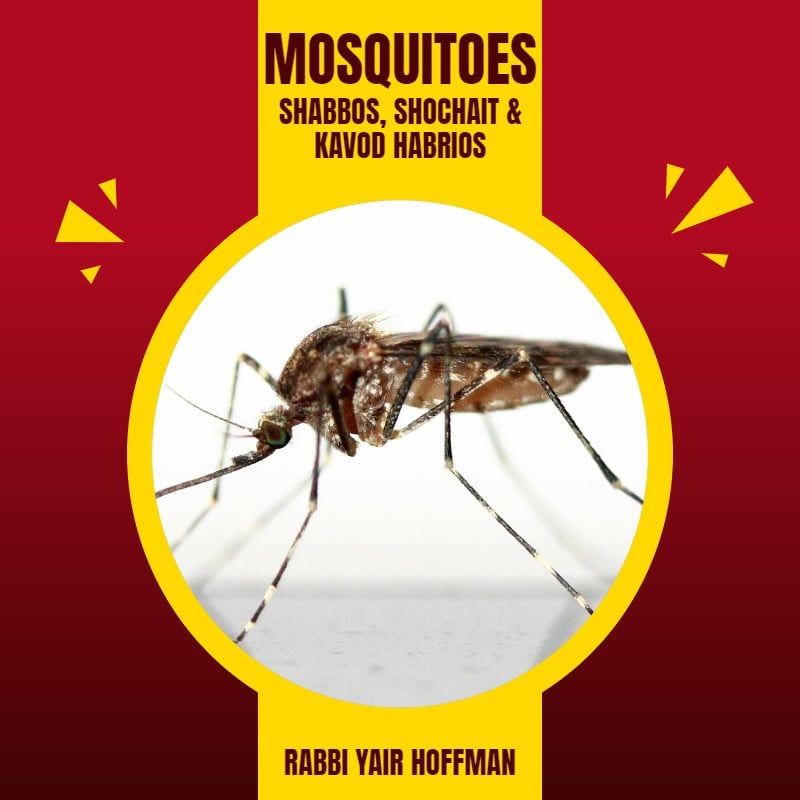Mosquitoes: Shabbos, Shochait & Kavod HaBrios

By Rabbi Yair Hoffman for 5tjt.com
For many thousands of Jewish families, this will be the first Shabbos in the mountains for the year. True, the bungalow or the house may have been cleaned, but there is one halachic question that arises each year.
THE QUESTION
The question is somewhat delicate, but since it is applicable to the laws of Shabbos – it needs to be discussed.
Imagine the scenario: It is hot and muggy. There is no central air conditioner and the rooms have their own ac units. All except one room – the bathroom. The light is left on, and the window is open – assuming there is a screen in half decent shape. But in that lay the faulty assumption – it is a bungalow after all. And because of phototaxis – the attraction of certain insects to light – the fly or other bug has entered the bathroom. Further still, because of the attraction to moisture – it has entered into the toilet itself.
One member of the family uses the facilities on Shabbos, but unfortunately, that bug has lodged itself in the toilet. If one flushes – one kills the bug. If one doesn’t flush, well, that is a breach in kavod habri’os – human dignity. What is the halacha?
THE PROHIBITION
The Gemorah in Shabbos (107b) tells us that the Torah forbidden Malacha of Shochait – slaughtering – even includes taking the life on an insect. However, we know that this Torah prohibition only applies if one benefits from it, such as eating it or deriving some chemical from it. The Shulchan Aruch (Orech Chaim 316:8) clarifies that killing a creature with no benefit is a Rabbinic prohibition. That being the case, the aforementioned dilemma becomes applicable.
KAVOD HABRIOS
When it comes to matters involving human dignity, however, there are times in which the Poskim point to leniencies. The rationale is that the Rabbis did not create the prohibition when it would violate human dignity. This concept should only be applied by Poskim who are familiar with how and when to apply this concept.
It should be noted, however, that in a case where he purposefully intends to kill the bug, then the act of flushing would be forbidden (see SA 377:9).
DAYAN WEISS’S VIEW
Dayan Yitzchok Yaakov Weiss zt”l in his Minchas Yitzchok Vol. X #27 addresses this very issue and concludes that it is permitted based upon a number of factors: Firstly, the flushing is only indirectly killing them and the issue is that of Kavod HaBrios – basic human dignity. The actual killing of the insect itself is not being done for food or for its skin – it is, therefore, a Rabbinic prohibition alone. We can thus apply the rationale that under such circumstances the Rabbis never made their prohibition.
Rav Vosner zt”l, in his Shaivet HaLevi (Vol. VI #94), also rules permissively in such a case.
WHAT IF THERE ARE OTHER BATHROOMS?
But what if one enters the bathroom and upon entering – one sees an insect floating in the water – may one flush it out a priori? Or must one find a different restroom?
We can perhaps distinguish between the cases where the bathroom was not yet used and the case where the bathroom was already used. When it was used already, one may still flush because it is a violation of kavod habrios to chance someone else entering and seeing an unflushed toilet. And even if it was not yet used, causing someone to travel or delay using the facilities may also be a problem of Kavod HaBrios.
IS IT MISASAIK – OBLIVIOUSLY PERFORMING AN ACTION?
One could perhaps even argue that it would be permitted – if one is merely clearing out the American Standard unit so that it could be used and one does intend to kill the insect, but just to move it out of the bathroom. Let’s say, for example, that it was not a bug – but a leaf, or some other object. Most people would pre-flush under such circumstances. That being the case, the pre-flush might be viewed as a misasaik, performing the possible malacha obliviously. Dayan Weiss entertains this possibility, arguing that we can consider it like misasaik since his intention is just to remove the bug – not kill it.
On the other hand, it is possible that a person may inadvertently intend for the bugs.
Of course, one should consult his own Rav or Posaik for these questions, unless it is too embarrassing to do so – in which case that too may be considered Kavod HaBrios.
One final thought. If there is a genuine concern for the zika virus in that area, or another dangerous disease, then most Poskim would permit killing a mosquito that has entered the house. This is on account of the fact that it may be pikuach nefesh.



